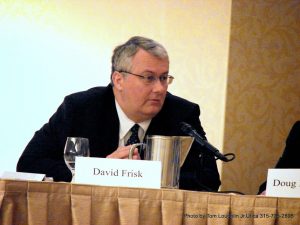Alexander Hamilton Institute for the Study of Western Civilization (AHI) Resident Fellow David Frisk presented a paper at the American Political Science Association’s (APSA) 2015 convention in San Francisco on September 6. The APSA Annual Meeting is the crossroads of the political science profession—its largest and most noted event.
Dr. Frisk’s essay was titled: “Aristocracy and the American Regime: The New Humanists’ Problem with Modern America.” The New Humanists—not to be confused with the secular humanists, associated with philosopher John Dewey—were a set of academic cultural conservatives that was prominent from the 1910s to the 1930s. Their most famous voice was Irving Babbitt of Harvard, author of Rousseau and Romanticism and Democracy and Leadership.
The best-known and most prolific cultural-conservative scholar of recent decades, Russell Kirk, praised Democracy and Leadership as “one of the few truly important works of political thought” ever produced in the United States and “perhaps the most penetrating work on politics ever written by an American.”
“Babbitt’s courageous emphasis on the moral quality of public life, and the centrality of virtue and character to good political leadership,” Dr. Frisk explains, “have had too little influence on conservative and classical-liberal thinking. I see this paper as eventually a significant part of a chapter in a book I have begun working on, which will explore what several under-appreciated political concepts can contribute to the long-elusive ‘fusion’ of conservative and classical-liberal thought.”
“Although aristocracy in the sense of ‘rule by the best’ is an essential theme in ancient political philosophy, its significance in modern times has tended to be either the rightly rejected idea of special power for a hereditary class, or else just exceptional ability of some kind—certainly a tremendously valuable thing, but in itself morally neutral.”
“In contrast, the New Humanists sought to revive the concept of people with superior virtue—especially in the sense of rejecting man’s natural will to power and following what they believed was an equally real ability to live according to a demanding conscience. They expressed the hope that such people might play a stronger, more authoritative role in society, mainly by force of example.” In Democracy and Leadership, Babbitt warned that not only the secularization of modern times, but also specifically American and classical-liberal overemphases on material progress and the completely self-reliant individual, were lowering the country’s moral tone while making politics an increasingly selfish clash of interests.
Presenting on the same panel were Andreas A.M. Kinneging, professor of legal philosophy at the University of Leiden in the Netherlands and a prominent conservative scholar it the country; Geoffrey Vaughan, associate professor of political science at Assumption College in Massachusetts and director of its Foundations of Western Civilization Program; and Ethan Alexander-Davey, a graduate student working with Professor James Ceaser of the Department of Politics at the University of Virginia.
The panel, which focused on the theme of aristocratic principles in the modern era, was sponsored by the Ciceronian Society, an organization of scholars stressing traditionalist and religious themes in political philosophy, law, and history. It is recognized as an “affiliated group” by APSA, allowing it to set up its own panels.
Last year, at the APSA convention in Washington, Frisk presented “A Commentary on the ‘Patrick Henry/Onslow’ Debate,” a series of public essays by John C. Calhoun and John Quincy Adams (or an author writing at Adams’s direction) in which they argued vehemently about constitutional powers.
A Resident Fellow at the AHI since 2013, Dr. Frisk teaches its adult education courses in history, politics, and political philosophy, and leads reading groups for Hamilton College students. He is the author of If Not Us, Who? William Rusher, National Review, and the Conservative Movement (ISI Books, 2012).


Leave A Comment